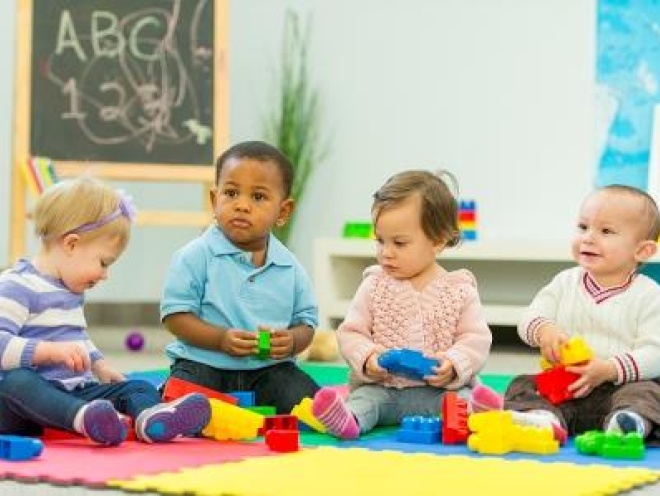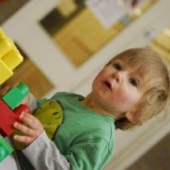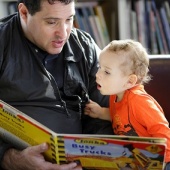As your child continues to develop at a rate of knots, imaginative play might come to the fore. Here we explore your child’s development at this age...
Development
Congratulations, you’re parent to an almost two-year-old. Your child has probably got the hang of walking and running freely. They might now begin to use their increasing dexterity.
They’ll love watching you to copy things you do. They might grab a dustpan and brush to try sweeping the floor, or turning the pages of a book to ‘read’.
Children at this age might begin to try to do things for themselves, too, like brushing their own teeth or putting on their clothes. If this is the case, encourage their emerging independence under your supervision – even if you have to step in when they get stuck.
Toddlers at this stage often start talking to their toys in imaginative play. This happens especially as their language develops and some can speak in two or more word sentences.
As ever, remember that children develop at different rates, so don’t worry if they’re not doing all these things yet (WHO Multicentre Growth Reference Study Group, 2006; NHS, 2016). Encourage whatever skills they are displaying and enjoy a really fun stage in their development.
Feeding
Carry on giving your child smaller portions of non-processed food that you eat yourself. And try to have mealtimes together as much as possible (First Steps Nutrition, 2016).
Your child will be drinking a lot less milk at this stage, and will probably be using a cup rather than a bottle. (NHS, 2015a). At mealtimes, offer water rather than fruit juice (which is high in free sugars) (First Steps Nutrition, 2016).
Continue to give your toddler full-fat milk to drink rather than the low-fat varieties. If you really want to and they’re eating well, you can give them semi-skimmed instead of full-fat milk after their second birthday (NHS, 2018). Otherwise it’s fine to still give them full-fat milk.
Health
Soon after your child’s second birthday, your health visitor will carry out a series of checks to make sure your child is developing (NHS, 2017). These will include hearing and speech tests, dexterity tests (such as whether they can build a tower of bricks), and an assessment of their social development.
It’s a good time for you to ask your health visitor if you have any concerns or questions about your child’s behaviour or development. If you’re really worried about something, you don’t have to wait until the review.
Sleeping
While every child is different, some people say their toddlers begin to drop a nap around the time they turn two years old. They’ll still need a long sleep at night of around 10 to 12 hours, especially if they have dropped their daytime sleep.
A bedtime routine of getting changed, brushing teeth and reading a story is still a fantastic way to settle your child. It’ll get them ready for the idea of sleep.
By the time they get to two years or a little bit older, you might consider moving them from a cot to a bed.
Baby care
When to start potty training is the big question that a lot of parents wrangle with at this age. You might be wondering whether this is a good age to start. You might even feel pressure from outside sources to have your toddler out of nappies.
It’s worth bearing in mind though that the NHS advises that most children are not ready until at least their second birthday (NHS, 2015b). That’s not to say that age is necessarily a good indication of readiness, but have a think about whether it’s the right time for you both to embark on the (inevitably messy) process.
Playing
Your child, then, will probably start to enjoy more imaginative and creative games than previously as they approach the two-year mark (Ma and Lillard, 2017). Their fine motor skills are improving at this age. That means they might like doing more intricate things like scribbling with crayons on a piece of paper.
Children at this age often enjoy putting their dolls or small figures in imaginary situations, such as pushing them around in a pushchair or giving them imaginary food to eat. You might find you’re involved in a teddy bear’s tea party or two… Some toddlers also might begin to get the hang of putting together Duplo LEGO or other construction toys.
Many children will also love playing with children’s versions of adult household appliances, such as microwaves or washing machines. And kicking balls around indoors and out is always a favourite, so you might need to clear some room.
Further information
Our support line offers practical and emotional support with feeding your baby and general enquiries for parents, members and volunteers: 0300 330 0700.
You might find attending one of our Early Days groups helpful as they give you the opportunity to explore different approaches to important parenting issues with a qualified group leader and other new parents in your area.
Make friends with other parents-to-be and new parents in your local area for support and friendship by seeing whatNCT activities are happening nearby.
Click here for more information on tackling toddler challenges.
First Steps Nutrition. (2018) Good food choices and portion sizes for 1-4 year olds. Available from: https://static1.squarespace.com/static/59f75004f09ca48694070f3b/t/5a926… [Accessed 1st October 2017].
Ma L, Lillard AS. (2017) The evolutionary significance of pretend play: Two-year-olds’ interpretation of behavioral cues. Learn Behav;45(4):441-448. Available from: https://www.ncbi.nlm.nih.gov/pubmed/28707061 [Accessed 1st October 2017].
NHS Choices. (2015a) Drinks and cups for babies and toddlers. Available from: http://www.nhs.uk/Conditions/pregnancy-and-baby/Pages/drinks-and-cups-children.aspx# [Accessed 1st October 2017].
NHS Choices. (2015) How to potty train. Available from: http://www.nhs.uk/Conditions/pregnancy-and-baby/Pages/potty-training-tips.aspx [Accessed 1st October 2017].
NHS Choices. (2016) Birth to five development timeline. Available from: https://www.nhs.uk/Tools/Pages/birthtofive.aspx [Accessed 1st October 2017].
NHS Choices. (2017) Your baby’s health and development reviews. Available from: http://www.nhs.uk/Conditions/pregnancy-and-baby/pages/baby-reviews.aspx [Accessed 1st October2017].
NHS Choices. (2018) Milk and dairy in your diet. Available from: http://www.nhs.uk/Livewell/Goodfood/Pages/milk-dairy-foods.aspx [Accessed 1st October 2017].
WHO Multicentre Growth Reference Study Group. (2006) WHO Motor development study: Windows of achievement for six gross motor development milestones. Acta Paediatrica Supplement (450):86-95. Available from: https://www.ncbi.nlm.nih.gov/pubmed/16817682 [Accessed 1st October 2017].
Further reading
Belsky Jay, Nezworski Teresa M. (2015) Clinical Implications of Attachment. Routledge.
Murray L. (2014) The Psychology of Babies. London: Constable & Robinson.
NHS Choices. (2015) Foods to avoid giving your baby. Available from: http://www.nhs.uk/conditions/pregnancy-and-baby/pages/foods-to-avoid-baby.aspx [Accessed 1st October 2017].







